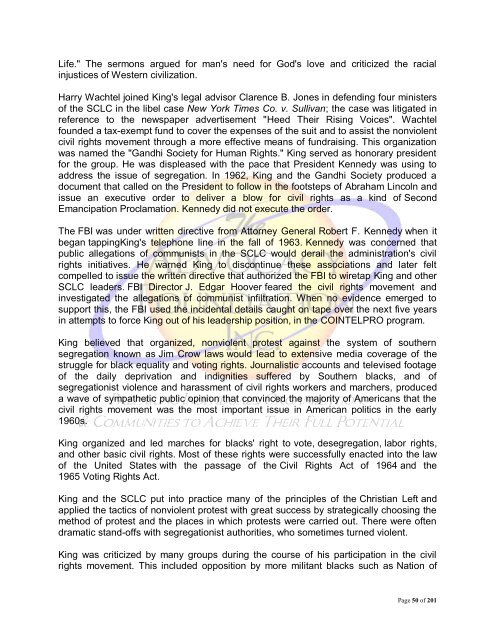Create successful ePaper yourself
Turn your PDF publications into a flip-book with our unique Google optimized e-Paper software.
Life." <strong>The</strong> sermons argued for man's need for God's love and criticized the racial<br />
injustices <strong>of</strong> Western civilization.<br />
Harry Wachtel joined King's legal advisor Clarence B. Jones in defending four ministers<br />
<strong>of</strong> the SCLC in the libel case New York Times Co. v. Sullivan; the case was litigated in<br />
reference to the newspaper advertisement "Heed <strong>The</strong>ir Rising Voices". Wachtel<br />
founded a tax-exempt fund to cover the expenses <strong>of</strong> the suit and to assist the nonviolent<br />
civil rights movement through a more effective means <strong>of</strong> fundraising. This organization<br />
was named the "Gandhi Society for Human Rights." King served as honorary president<br />
for the group. He was displeased with the pace that President Kennedy was using to<br />
address the issue <strong>of</strong> segregation. In 1962, King and the Gandhi Society produced a<br />
document that called on the President to follow in the footsteps <strong>of</strong> Abraham Lincoln and<br />
issue an executive order to deliver a blow for civil rights as a kind <strong>of</strong> Second<br />
Emancipation Proclamation. Kennedy did not execute the order.<br />
<strong>The</strong> FBI was under written directive from Attorney General Robert F. Kennedy when it<br />
began tappingKing's telephone line in the fall <strong>of</strong> 1963. Kennedy was concerned that<br />
public allegations <strong>of</strong> communists in the SCLC would derail the administration's civil<br />
rights initiatives. He warned King to discontinue these associations and later felt<br />
compelled to issue the written directive that authorized the FBI to wiretap King and other<br />
SCLC leaders. FBI Director J. Edgar Hoover feared the civil rights movement and<br />
investigated the allegations <strong>of</strong> communist infiltration. When no evidence emerged to<br />
support this, the FBI used the incidental details caught on tape over the next five years<br />
in attempts to force King out <strong>of</strong> his leadership position, in the COINTELPRO program.<br />
King believed that organized, nonviolent protest against the system <strong>of</strong> southern<br />
segregation known as Jim Crow laws would lead to extensive media coverage <strong>of</strong> the<br />
struggle for black equality and voting rights. Journalistic accounts and televised footage<br />
<strong>of</strong> the daily deprivation and indignities suffered by Southern blacks, and <strong>of</strong><br />
segregationist violence and harassment <strong>of</strong> civil rights workers and marchers, produced<br />
a wave <strong>of</strong> sympathetic public opinion that convinced the majority <strong>of</strong> Americans that the<br />
civil rights movement was the most important issue in American politics in the early<br />
1960s.<br />
King organized and led marches for blacks' right to vote, desegregation, labor rights,<br />
and other basic civil rights. Most <strong>of</strong> these rights were successfully enacted into the law<br />
<strong>of</strong> the United States with the passage <strong>of</strong> the Civil Rights Act <strong>of</strong> 1964 and the<br />
1965 Voting Rights Act.<br />
King and the SCLC put into practice many <strong>of</strong> the principles <strong>of</strong> the Christian Left and<br />
applied the tactics <strong>of</strong> nonviolent protest with great success by strategically choosing the<br />
method <strong>of</strong> protest and the places in which protests were carried out. <strong>The</strong>re were <strong>of</strong>ten<br />
dramatic stand-<strong>of</strong>fs with segregationist authorities, who sometimes turned violent.<br />
King was criticized by many groups during the course <strong>of</strong> his participation in the civil<br />
rights movement. This included opposition by more militant blacks such as Nation <strong>of</strong><br />
Page 50 <strong>of</strong> 201

















